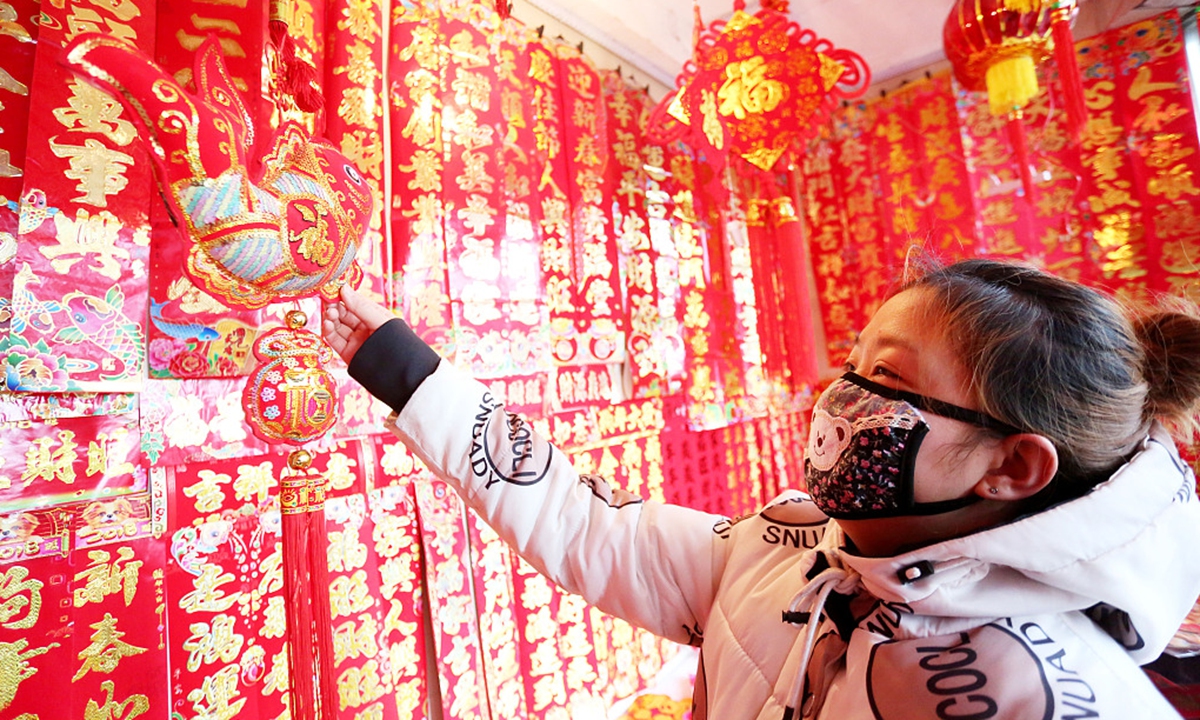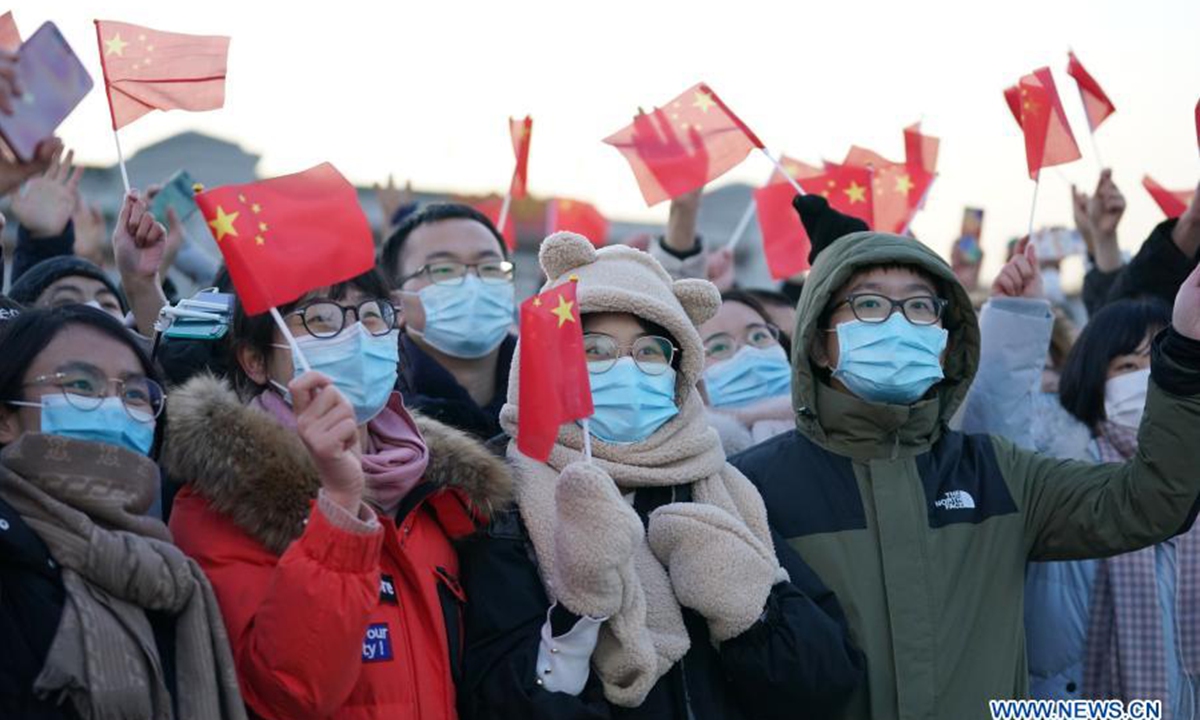
File photo: CFP
As people across China prepare for Spring Festival, the biggest annual holiday in the Chinese lunar calendar, clusters of new COVID-19 outbreaks in several areas have raised concerns over a resurgence of the virus, and a swift response from many provinces and regions to introduce tightened regulations on travel and other consumer behaviors foreshadowing a relatively challenging holiday season ahead.
For many across the nation, new uncertainties brought by the epidemic bring complex emotions, as they are eager to celebrate the most important annual holiday after an extremely tough year in 2020 but are also aware of the new risks and the need to do their part in the country's efforts to rein in new outbreaks and consolidate the hard-fought gains of the past year.
For businesses - from factories in manufacturing hubs in the south and east to online shopping platforms in first-tier cities like Beijing - new risks mean a call to action, as they move swiftly to prepare for potential disruptions, with some encouraging employees to stay put to avoid potential labor shortages, while others are extending businesses hours to cope with rising demand.
While a potential resurgence of the virus and new restrictions could cause disruptions to certain economic activities, particularly for small businesses, overall operations are expected to improve significantly from the dark period in 2020 that contributed to a record plunge in China's GDP, as anti-epidemic efforts are more measured and businesses are able to make early adjustments, analysts noted.
New challenges
Just two weeks ago, as China continues on a steady path to normality and many across the nation were eager to return to home to celebrate the Chinese new year after a turbulent year, the country's rail authorities rolled out plans for the upcoming chunyun - the name for the annual 40-day period travel rush in which hundreds of millions of journeys are made. The rail operator estimated that 407 million trips could be made during the period with a daily average of 10.18 million, up 93.4 percent from 2020.
But that sense of a return to normalcy has been thrown into question after new outbreaks in several areas, including North China's Hebei Province, where 22 million people have been put under lockdown amid rising infections. New cases have been reported in several other places, including Northeast China's Heilongjiang Province and North China's Shanxi Province.
The response to the new outbreaks was swift from everyone from local officials to national policymakers. China's National Health Commission on Saturday suggested people should stay in their working city during the Spring Festival and try to buy goods online to avoid spreading the virus in winter, when the virus could be spread more easily. Dozens of local governments have followed suit in issuing similar guidelines, and some local authorities have put restrictions on gatherings, including commercial activities.
Following the measures, the National Development and Reform Commission, the country's top economic planner, said on Tuesday that travel would be "significantly lower than normal years" and there is "relatively strong uncertainty" about passenger volume.
The new restrictions "will have impacts on temple fairs, New Year 's Eve dinners and other common activities we see during a regular Chinese New Year," Peking University economist Cao Heping told the Global Times. Cao noted that the overall atmosphere would be impacted this year again, though it is expected to be much better than last year.
During Chinese New Year in 2020, much of the country was under a lockdown which saw the consumers hunkering down, businesses shut down and travel stopping, which continued for weeks afterward. Even after the strict restrictions were lifted, businesses faced tremendous challenges in restarting operations, as migrant workers were unable to return to work, cash supplies dried up and new orders were slow to come in. The ultimate cost: China's GDP shrank 6.8 percent in the first quarter.
As cases resurge and restrictions are reintroduced, there are rising concerns that those challenges will return and cause similar disruption to business activities during the holiday season, which traditionally is a peak season for consumption but a relatively slow period for production.

People wave Chinese national flags after a national flag-raising ceremony was held at the Tian'anmen Square in Beijing, capital of China, Jan. 1, 2021. The ceremony was part of the celebrations for the New Year's Day. (Xinhua/Ju Huanzong)
Early preparation
Anticipating such problems, businesses across the country have already started to prepare for potential challenges, including labor shortages, logistics and delays in completing orders.
In Shenzhen, the manufacturing giant Foxconn has launched a mass recruitment campaign to ensure sufficient labor before and after the Chinese New Year, a source at the company told the Global Times on Tuesday, adding that it is offering "the highest salary" of 29 yuan ($4.47) per hour to incentivize workers to stay during the holidays.
As many migrant workers plan to return home for the holidays early to avoid potential lockdowns, there have been reports of labor shortage in some manufacturing hubs. There is also concern that workers may be unable to return to work on time after the holidays due to restrictions.
Such worries and the intention to stem the spread of the virus have led governments and companies to encourage workers to stay where they work for the holidays to ensure steady production. Images from last year of countries competing for desperately needed products, particularly medical supplies, amid a global shortage around the holidays remain fresh.
"We are operating at full steam to meet the increasing orders from overseas, and these orders are not expected to dwindle in the next six months," Zhao Deyi, manager of a chair manufacturing company based in Anji in East China's Zhejiang Province, told the Global Times on Tuesday. "It would be very convenient if the workers can stay here for the Spring Festival and quickly return to work afterwards."
In Dongguan, South China's Guangdong Province, some companies offered up to 5,000 yuan for each worker that decides to stay during the holidays, after the city issued guidelines to advise against "unnecessary travel" outside the city.
Some companies have also adjusted product capacities to cope with potential challenges during the holidays. In Dongguan, car model manufacture Maisto has been "producing some standard parts ahead of the holiday to avoid the labor shortage," manager John Ng told the Global Times.
In Wuhan, Central China's Hubei Province, one of the leading suppliers of infrared thermal imaging products in China, said that it has expanded capacity to meet a 10 percent increase in orders so it does not need to work overtime.
"The holiday restrictions could be beneficial for supply side, as workers would be able to rush if there are more orders," Tian Yun, vice director of the Beijing Economic Operation Association, told the Global Times, noting that due to the global pandemic, many countries have strong demand for goods produced in China.
However, the restrictions could hit small businesses hard, such as restaurants, grocery stores and other mom-and-pop stores, which have already endured a tough year. In Beijing, many small restaurants have already shut their doors, as fewer people are going out to eat ahead of the holidays.
"I don't think we will return next year. It's just hard to predict what will happen now, with all the new cases and new regulations," the owner of a Xinjiang-style restaurant in Beijing told the Global Times on Tuesday, "businesses recovered a little bit over the past several months but then we faced a new wave."
However, even as some businesses will face a tough time, others, particularly online shopping sites, could see strong demand during the holidays, as many will turn to online delivery for groceries, analysts said.
Some online shopping platforms, including electronics retailer Suning and on-demand delivery services provider Dada, have already announced that they would stay open during the holidays. "Dada Now continues to offer "no close/shutdown" service to consumers across the country this Festival," the company told the Global Times on Tuesday, adding that it would have safety measures in place to ensure safe and quick services.
The early preparation by companies and the growth in orders and consumption foretell relatively stable economic operations during the Chinese New Year, though some businesses and sectors will face some impact and festivities will be low-key, analysts said.
"Holiday spending should be higher than last year, as many are expected to stay in big cities and they will still consume, even as they work extra hours," Cao said.

